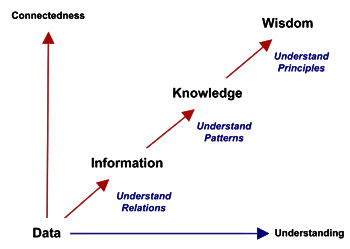
As is probably already apparent to regular readers of this blog, I take rather a visual approach to both understanding things and communicating them. Seldom will I leave a one-on-one meeting without having scrawled on a sheet of paper to explain my train of thought, or to ensure that I have properly understood what someone else has said; equally I tend to be an avid scribbler on flip-charts or wipe-boards during larger gatherings.
I was recently engaged in a debate about whether information was a prerequisite to knowledge; unsurprisingly I felt that it was. The discussion took place on the LinkedIn.com Business Improvement, Change Management & Turnaround group and was actually in response to one of my recent articles, “Why Business Intelligence projects fail.” This led to me thinking about the area further and, inevitably to some googling.
The above path led me to an article on systems-thinking.org entitled Data, Information, Knowledge, and Wisdom, written in 2004 by Gene Bellinger, Durval Castro and Anthony Mills. Returning to the visual theme that I introduced at the start of the article, my eyes were drawn to the following graphic (I have re-drawn this as a larger …

As is probably already apparent to regular readers of this blog, I take rather a visual approach to both understanding things and communicating them. Seldom will I leave a one-on-one meeting without having scrawled on a sheet of paper to explain my train of thought, or to ensure that I have properly understood what someone else has said; equally I tend to be an avid scribbler on flip-charts or wipe-boards during larger gatherings.
I was recently engaged in a debate about whether information was a prerequisite to knowledge; unsurprisingly I felt that it was. The discussion took place on the LinkedIn.com Business Improvement, Change Management & Turnaround group and was actually in response to one of my recent articles, “Why Business Intelligence projects fail.” This led to me thinking about the area further and, inevitably to some googling.
The above path led me to an article on systems-thinking.org entitled Data, Information, Knowledge, and Wisdom, written in 2004 by Gene Bellinger, Durval Castro and Anthony Mills. Returning to the visual theme that I introduced at the start of the article, my eyes were drawn to the following graphic (I have re-drawn this as a larger version was not available on the site, but it remains the work or Messrs Bellinger, Castro and Mills):
Of course I appreciate that systems-thinking.org piece is intended to have a broad applicability. However, to me, this schematic pithily captures the fact that Business Intelligence is not just about technology and cannot be effective in isolation. To live and breath it needs to be part of a broader framework covering the questions that its users need to answer, the actions that they take based on these answers and the iterative learning that occurs in the process.
Again thinking in terms of pictures, the data to wisdom hierarchy outlined by Bellinger et al brings another image to mind, the one appearing below:

In the same way that Natural Selection offers a compelling framework for the phenomenon of Evolution, all-pervasive business intelligence can offer a compelling framework within which an organization can evolve towards collective wisdom. Of course, in the same way that Evolution does not always imply increased sophistication (just better adaptation to a particular niche), the technological part of business intelligence, in and of itself, does not guarantee an improved organization. Such an outcome is instead the product of developing an appropriate vision for how the organization will operate in the future and then working assiduously to get the organization to embrace this.
I have often spoken about the importance of incorporating BI in an organisation’s DNA. The above analogy brings a different dimension to this metaphor. Both the evolution of species and the evolution of organizations are driven by incremental changes to what makes them tick, but also by occasional great leaps forward; a concept known as punctuated equilibrium) in Evolutionary Biology. Introduction of good BI can be such a great leap forward, but hopefully without the connotation of Mao Zedong.
Returning to the original model, Data and Information may have strong technological elements (though the former certainly has more than the latter, see BI implementations are like icebergs), but Knowledge and Wisdom imply a more human angle; even in these days of automated decision-making with the results of analysis fed back into operational systems. This anthropocentric approach, in turn, raises the profile of cultural transformation in business intelligence programmes; something that my experience teaches me is crucial to their success.
These are all themes that I have written about before (e.g. in The confluence of BI and change management), but it is interesting to find a diagram that approaches the area from a different slant.
It is also helpful to learn that I am not alone in thinking that information is one of the major pillars of knowledge!
| Tweet this article on twitter.com | |
| Bookmark this article with: | |||||
| | | | | | | | | ||
Posted in business, business intelligence, cultural transformation, technology Tagged: Anthony Mills, Durval Castro, evolution, Gene Bellinger, information, knowledge, systems-thinking.org, wisdom
![]()






